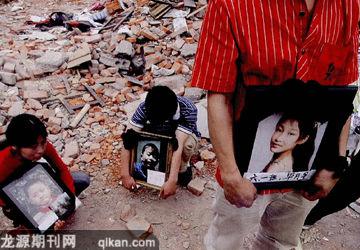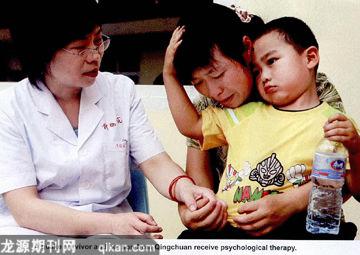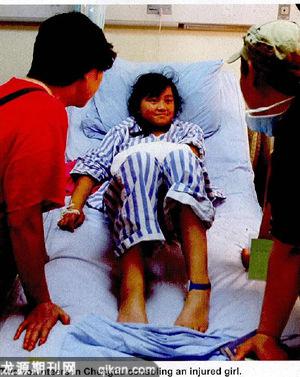After the Quake:Psychological Treatment Following the Disaster
By staff reporter LIU QIONG

Psychological Care for Young Survivors
“Earthquake, run!” Since the Sichuan earthquake, sixth-grader Wen Dengyu from Xinjian Primary School, Dujiangyan City, can often be heard shouting these words in his sleep. When the quake hit, Wen was in class on the fourth floor of his school. He managed to rush out of the building and into the playground, but many of his classmates and his teacher were less fortunate. Wen Dengyu saw them buried alive by the collapsing school building.
“Psychological wounds from a disaster are far more serious for children than adults,” said Wang Yanling, a psychotherapist from Beijings Sino-Japanese Friendship Hospital. Statistics from the Chengdu Childrens Hospital support Wangs claim: over 60 percent of the child patients who survived the May 12 earthquake have since lived in a state of constant apprehension. “Of all kids,” Wang Yanling continued, “primary school-aged children seem more vulnerable to psychological disorders than anyone else, simply because their psychology and way of thinking are not mature. They may appear strong after the quake, but deep in their hearts they are obsessed by fear.”

That is why there are a large number of psychotherapists among the rescue workers in the quake-hit area. On May 22, for example, psychotherapists from Fudan University, Shanghai, arranged toy tanks, miniature angels and houses in a temporary residence for student survivors from Beichuan Middle School. After the children had selected a toy, Prof. Shen Heyong asked them to sit around a table. “Why did you choose a toy house instead of something else?” he asked one child. “My family lost our house in the quake,” the student replied. “I want to have a stronger one that can withstand earthquakes.” The purpose of the professors game was to encourage students to speak their innermost thoughts, and hopefully begin to release the fear that continues to grip many of them.
Dr. Yin Yin Nwe, an official from the United Nations Childrens Fund (UNICEF) currently working in China, believes it is vital to provide children with psychological help as early as possible. “About 95 percent of children, through collective activities and other forms of therapy, will be able to heal their psychological wounds,” said the doctor. “With the passing of time, they are able to lead a normal life. However, around 5 percent will need ongoing treatment.”
“We should let them speak about their psychological pain, and say it in their own way,” explained Wang Yanling. “We should exercise patience, and never push them to do anything. Using a language they can comprehend, we should tell them about earthquakes. Actually, sufferings in childhood may help children grow into stronger characters. We should trust their ability to endure.”
“Chicken Soup for the Soul”
Fear, helplessness and sadness that grip the mind and refuse to let go – these are the symptoms of post-disaster trauma seen not only in children but also adult survivors.
A comment from a Xinjian Primary School teacher in Dujiangyan illustrates the emotional scars survivors are left with: “I doubt I can teach students any more, for their faces will remind me of the dead children, repeatedly reopening my psychological wound.” The teacher was not inside her classroom when the quake struck, but witnessed the building collapse in seconds, burying many of her students and colleagues. She and a few childrens parents who were present immediately began digging through the debris in an effort to save those buried. She could hear students singing under the rubble in an effort to comfort and encourage one another, in spite of the tremendous pain they were suffering. None survived.

“People like that teacher are both victims and rescuers,” commented psychotherapist Yu Donghui. “Of all those who come through disaster, they tend to suffer the most psychological pain.” Without help, it is very difficult for these people to rid themselves of the nightmare they have lived through and get back to a normal life.
Statistics reveal the scale of psychological problems that linger after huge disasters. Anxiety disorders, phobias and neuroses among survivors of the massive 1976 Tangshan earthquake in northern China were three to five times higher than in normal populations.
Zhang Qiuling holds a PhD in psychological studies from Beijing Normal University, and was involved in rescue work after the Puer earthquake in Yunnan last year and the flood in Dazhou, Sichuan in 2005. When a victim is suffering intense sadness, said Zhang Qiuling, those offering comfort should not try to stop his or her wailing. An embrace, even without words, is good support. Letting the victim release his or her emotions helps to heal psychological wounds.
The earliest post-disaster psychological services offered to victims in China were established in 1994, following a devastating fire in Karamay, Xinjiang Uygur Autonomous Region. Though similar help was offered on several subsequent occasions, psychological services were not well understood by the general public, and many mistook the concept of psychological disorders as “mental disease” and refused any assistance. Changing these ideas and encouraging people to accept help as early as possible and avoid a lasting psychological shadow has been Zhang Qiulings long-term aim. She believes the need for psychological assistance after the Sichuan earthquake will be huge, and more than current professional medical workers can cope with. She says local personnel should be trained. Armed with even simple skills, they can provide much benefit and pass on knowledge to other local people.
Equal Attention for Rescuers Psychological Health

“Not only the rescued, but also the rescuers need psychological help to some extent,” said Wang Yanling. “This includes those from welfare institutes and government departments, as well as policemen, soldiers and reporters.”
Psychological therapist Su Xiaoxin recalled an incident during the rescue operation at a ruined chemical plant in Yinghua Town that supports Wang Yanlings assertion. All the plants buildings collapsed in the earthquake, but on the afternoon of May 16 rescue workers from Nanjing Fire Brigade discovered a survivor, 51-year-old Liu Deyun, who had been trapped in the debris for 100 hours. Liu Deyuns left foot had been crushed by falling cement, and it quickly became apparent that amputation was the only way to extract him from the rubble.
Guided by doctors, Xu, a 24-year-old firefighter, stopped Lius bleeding, anesthetized him and amputated his foot. The victim was saved, but that evening the young firefighter was silent and refused food. He was racked with guilt for failing to get the buried man out intact. Su Xiaoxin patiently listened to him and discussed why amputation was the only choice. To bolster Xus psychological state, Su Xiaoxin told him of the gratitude expressed by the rescued mans family. Their talk had the desired effect and Xu quickly regained his composure.
“After seeing such heavy loss of human life and the tremendous pain survivors have suffered, coupled with an unbelievable workload, rescue workers are likely to have psychological disorders,” explains Wang Yanling. “This can happen to policemen, soldiers and even some medical workers. Their psychological situation needs equal attention.”
With rapid changes taking place to the global environment and climate, Wang Yanling said, the world has entered a high-risk historical period. Major disasters are happening with increasing frequency, and more and more people in China are affected each year by accidents of various kinds, including natural and man-made catastrophes, traffic accidents and various forms of violence. On April 17, 2002, a range of central government departments jointly issued the Working Plan for Mental Health, a document that identifies disaster survivors as a group requiring special care. According to the plan, by 2010 around 50 percent of disaster survivors will be able to receive timely psychological help. The supply of professionals remains a problem however. There are only 15,000 doctors nationwide working in mental health, and of these only one-third are fully trained professionals.
For Wang Yanling, psychological assistance following disasters is not short-term work, but a long-term commitment. She said a framework is urgently required to cover all aspects of disaster rescue work, including psychological and medical assistance, disease prevention and timely provision of material aid.
Meanwhile, the Chinese government and international rescue groups have started providing psychological support services for survivors of the Sichuan quake. In Chengdus Huaxi Hospital, for example, a non-governmental organization is recruiting volunteer mothers for children who have lost parents in the disaster. Shanghai, Qingdao, Harbin and Guangdong, besides sending volunteer psychological workers to the earthquake-hit areas, have established 24-hour hotlines to provide assistance to those in need. And a group of 20 workers from Tangshan are on their way to Sichuan. Most of them have their own tales of survival in the Tangshan quake of 1976. Fortunately, in a mark of changing times, the Sichuan victims will receive the kind of assistance that simply was not available to Tangshan survivors 32 years ago.

